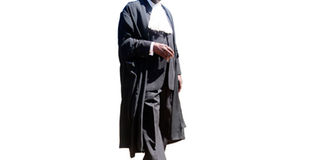Kanyeihamba views on women MPs smacks of male chauvinism

Prof George Kanyeihamba
What you need to know:
- Between 1986 and 1989, the NRC only comprised ‘Historicals’; men and a few women who had served as legislators during and after the five-year bush war.
Prof George Kanyeihamba, who once served as a Supreme Court judge and Attorney General, has recently been in the news. Although he contributes to intellectual discourse in Uganda, especially through newspapers, he has at the same time cut a niche for stirring controversy. In his latest controversial discourses, he has argued that experienced Women MPs who got elected on the affirmative action ticket, have overstayed and should resign by 2021. What audacity!
It is glaringly obvious that Prof Kanyeihamba and like minds are targeting the Speaker of Parliament, Ms Rebecca Kadaga, who has been in the House since 1989. Others include Ms Cecilia Ogwal and Ms Ruth Nankabirwa. These ladies joined politics when the National Resistance Council (NRC), the NRM’s legislative arm, sought to get national acceptance.
Between 1986 and 1989, the NRC only comprised ‘Historicals’; men and a few women who had served as legislators during and after the five-year bush war. During debate of the 1995 Constitution, it was decided that there should be slots in Parliament for women, youth, persons with disabilities and the Army.
That background aside, Prof Kanyeihamba is exhibiting double standards. Why isn’t he moving a similar argument about the male MPs? Some men have been in Parliament for the last 40 years; in fact 10 years longer than the women he is attacking!
Readers, why should it be right for men to serve endless terms in political office, but wrong for women to do so as long as they are subjected to free and fair elections?
Prof Kanyeihamba and people who think like him, where is the fairness in your arguments? If this isn’t male chauvinism, then what is it? Should there be a ceiling that bars women from re-contesting, but none for men? Is this what equality before the law is all about?
Finally, Uganda’s 1995 Constitution outlines National Objectives and Directive Principles of State Policy. Under Political Objectives: Democratic Principles, it is stated thus:
“The State shall be based on Democratic Principles which empower and encourage active participation of all citizens at all levels in their own governance; (ii) That all people shall have access to leadership positions at all levels, subject to the Constitution.”
Therefore, as a Constitutional lawyer, who played a pivotal role in drafting the said document, and as a long serving Supreme Court judge, are you trying to abrogate this sacred national set of principles?
Bruno Serunkuma
Kampala.




